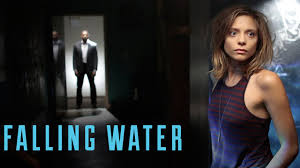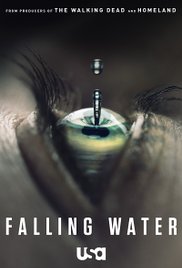 The second episode of the excellent new TV series “Falling Water” (USA Network) starts with a creepy voiceover from a character who later reveals the frightening extent of his powers in the dream realm. He quotes from Shakespeare’s play “Henry IV Part I,” when two English lords plot a rebellion against the king:
The second episode of the excellent new TV series “Falling Water” (USA Network) starts with a creepy voiceover from a character who later reveals the frightening extent of his powers in the dream realm. He quotes from Shakespeare’s play “Henry IV Part I,” when two English lords plot a rebellion against the king:
Glendower: I can call spirits from the vasty deep.
Hotspur: Why, so can I, or so can any man; But will they come when you do call for them?
(III.i.57-59)
The episode takes its title from this quote, which poetically highlights the dangers inherent in exploring the “vasty deep” of lucid dreaming. Be careful what you wish for with dreaming, because it might become a more powerful and autonomous reality than you were expecting.
The 19th century German philosopher Friedrich Nietzsche expressed a similar insight in his 1886 work Beyond Good and Evil, aphorism 146:
“He who fights with monsters should look to it that he himself does not become a monster. And when you gaze long into an abyss the abyss also gazes into you.”
It has to be a great TV show if I’m quoting Shakespeare and Nietzsche and I haven’t even gotten to the oneirogenic blues LP, the two big guys in black suits with no faces, the ethical complexities of gathering pure scientific data, and the deepening mystery surrounding Topeka, “a good place to dig for roots.” I’m hooked, most definitely hooked!

Below is what I wrote in the Huffington Post after watching the first episode.
Finally, someone gets it right: a television show about dreams that feels genuinely dreamy. “Falling Water,” a new series on the USA Network premiering October 12, centers on three characters (Tess, Burton, and Taka) who learn how to enter a dangerous, shadowy world of shared dreaming. I just watched the first episode (available online), and I’m very, very impressed! After years of complaining about lame, painfully unimaginative portrayals of dreaming in television and movies, I can now say there is a TV show that accurately, and entertainingly, conveys many of the sensory qualities and content themes that typify actual dreaming.
Foremost among those themes is, as the title suggests, falling water. I won’t reveal any plot twists, nor will I describe in too much detail the many beautiful images of water in the first episode, but suffice it to say that the element of water is essentially another character in the show. It flows in many different directions, over various surfaces and bodies, and ultimately down into mysterious depths. As a quick search for “water” words in the SDDb reveals, this element is indeed a very prominent feature of people’s dreams, and it has a long history of multi-dimensional symbolism. It will be fun watching future episodes to see how this theme develops over time.
Another prominent theme has to do with visual experience. Eyes, windows, mirrors, glasses, and other reflective surfaces abound in the first episode, creating a kaleidoscopic perceptual atmosphere for the characters and viewers alike. Visual sensations are also very prominent in actual dreaming, and in my recent Big Dreams book I talk about the roots of visual dreaming in terms of hard-wired neural activities in the sleeping brain. I refer to an “autonomous visionary capacity” that is innate in all humans and capable of generating powerful, creative, and highly realistic visual experiences in dreaming. The premise of “Falling Water” seems to be that people can potentially cultivate that inner capacity for powerful visionary dreaming and channel it in specific directions. It’s an exciting and reality-based premise that opens up lots of narrative possibilities for future episodes.
The theme of trying to control one’s dreams raises unsettling ethical issues that religious and spiritual traditions around the world have debated since ancient times. Are methods and tools of dream control a way of enhancing and amplifying the dreaming process, or do they ruin dreams by imposing the shallow desires of the waking ego on the wisdom of the unconscious psyche? Could more control of our dreaming promote greater self-knowledge, emotional health, and problem-solving abilities, or is it a harmful violation of our inner world and a potentially destructive way of exploiting people’s deepest fears and vulnerabilities? Perhaps most worrisome of all, if we forcefully try to control our dreams, are we ready for the possibility our dreams will fight back? These questions are becoming even more urgent today, thanks to the emergence of a new generation of dream-stimulating technologies (exaggerated, but not by much, in the show).
The final scene of the first episode raised the specter of a “war” for control of our dreams, and I’m curious to see how that alarming notion plays out. This might sound like science fiction, and it is exactly that, science fiction at its best: a dramatized version of cutting-edge scientific findings, technological innovations, and cultural trends whose real-world consequences are just dawning on us. We are living in a world where various forces, some benign and others much less so, are competing for influence over our minds, in waking and in sleeping. “Falling Water” is poised to reflect that emerging reality back to us in a fictional medium that, paradoxically, will probably have a tangible impact on the real dreams of its viewers.
Having watched a lot of dream-related movies and television shows over the years, I can’t help but notice several visual and thematic references in “Falling Water,” all of which bode well for it future direction. Most viewers will immediately associate the show’s premise with the 2011 film Inception and its portrayal of skilled agents entering into other people’s dreams and trying to manipulate them. But “Falling Water” seems to be aiming for something bigger, more along the lines of the 1999 film The Matrix, with its mind-bending metaphysical combat and prophetic call for a new, more advanced kind of consciousness. More than either Inception or The Matrix, however, “Falling Water” goes deeper into the creepy depths of the collective unconscious, with an occult mystery theme that reminds me of the first excellent season of the 2014 TV show “True Detective.” Some of the visuals and epistemological paradoxes in “Falling Water” are strikingly reminiscent of the 1988 film “Jacob’s Ladder,” which used the Tibetan Book of the Dead as a template for describing a soldier’s journey through a nightmare world located somewhere between life and death. And there are several parallels to the Nightmare on Elm Street series of films, starting in 1984, which used schlocky special effects to dig deeply into the dark, festering corners of the American psyche. A striped shirt appears on a key character in “Falling Water,” which does make one wonder.
The touchstone for any show like this is always “Twin Peaks,” the David Lynch television series from the early 1990’s, which is set to reboot with new episodes soon (!!). “Twin Peaks” featured a dream-inspired FBI agent who tracked down an evil entity haunting people’s minds and forcing them to violate the laws and morals of the waking world. In its incredible beauty, emotional rawness, and surrealistic whimsy, “Twin Peaks” portrayed aspects of genuine dreaming in a more compelling way than perhaps America was ready to handle at the time. The first episode of “Falling Water” does not have any of the levity and comical weirdness of “Twin Peaks,” which may be a good thing at the start (no dwarves in red suits) but will hopefully appear in some form in later episodes. There’s bound to be lots of falling in this show; will there also be flying?
 What would you do if you could control not only your own dreams, but other people’s dreams, too? What if you could enter other people’s dreams without their knowing it? How would you use those powers? Do the same ethical principles that guide our waking lives also apply in dreaming?
What would you do if you could control not only your own dreams, but other people’s dreams, too? What if you could enter other people’s dreams without their knowing it? How would you use those powers? Do the same ethical principles that guide our waking lives also apply in dreaming?
 The second episode of the excellent new TV series
The second episode of the excellent new TV series 